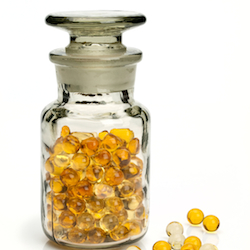
The collaborative group of scientists from the Leumit Health Services (LHS) and the Azrieli Faculty of Medicine of Bar-Ilan University aimed to determine associations of low plasma vitamin D with the risk of COVID-19 infection and hospitalization. Using the real-world data and Israeli cohort of 782 COVID-19 positive patients and 7,025 COVID-19 negative patients, the groups identified that low plasma vitamin D level appears to be an independent risk factor for COVID-19 infection and hospitalization. The research was published in The FEBS Journal.
“The main finding of our study was the significant association of low plasma vitamin D level with the likelihood of COVID-19 infection among patients who were tested for COVID-19, even after adjustment for age, gender, socio-economic status and chronic, mental and physical disorders,” said Dr. Eugene Merzon, Head of the Department of Managed Care and leading researcher of the LHS group.
“Furthermore, low vitamin D level was associated with the risk of hospitalization due to COVID-19 infection, although this association wasn’t significant after adjustment for other confounders,” he added. “Our finding is in agreement with the results of previous studies in the field. Reduced risk of acute respiratory tract infection following vitamin D supplementation has been reported,” said Dr. Ilan Green, Head of the LHS Research Institute.
“According to our analysis, persons that were COVID-19 positive were older than non-infected persons. Interestingly, the two-peak distributions for age groups were demonstrated to confer increased risk for COVID-19: around ages 25 and 50 years old,” said Dr. Milana Frenkel-Morgenstern, the leader of the Azrieli Faculty of Medicine research group. “The first peak may be explained by high social gathering habits at the young age. The peak at age 50 years may be explained by continued social habits, in conjunction with various chronic diseases,” Dr. Frenkel-Morgenstern continued.
“Surprisingly, chronic medical conditions, like dementia, cardiovascular disease, and chronic lung disease that were considered to be very risky in previous studies, were not found as increasing the rate of infection in our study,” noted Prof. Shlomo Vinker, LHS Chief Medical Officer. “However, this finding is highly biased by the severe social contacts restrictions that were imposed on all the population during the COVID-19 outbreak. Therefore, we assume that following the Israeli Ministry of Health instructions, patients with chronic medical conditions significantly reduced their social contacts. This might indeed minimize the risk of COVID-19 infection in that group of patients,” explained Prof. Vinker.
Dr. Dmitry Tworowski and Dr. Alessandro Gorohovski. from the Frenkel-Morgenstern laboratory at Bar-Ilan University’s Azrieli Faculty of Medicine, suggest that the study will have a very significant impact. “The main strength of our study is its being large, real-world, and population-based,” they explained. Now researchers are planning to evaluate factors associated with mortality due to COVID-19 in Israel. “We are willing to find associations to the COVID-19 clinical outcomes (for example, pre-infection glycemic control of COVID-19 patients) to make the assessment of mortality risk due to COVID-19 infection in Israel,” said Dr. Eugene Merzon.
For more on how Vitamin D levels may affect the lungs inflammatory response, read New Pathway & Bradykinin Storm Found in COVID-19 Inflammatory Response.





